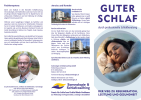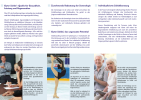
INFOS AND TIPS FOR YOUR SLEEP
To assess the influence of stress and other factors on sleep, a person's usual sleep patterns under normal conditions must be known, because there are large differences in individual sleep duration and variability.
SLEEP DURATION AND AGE
Adult individuals sleep an average of 7 to 8 hours. Extreme short sleepers are refreshed after 4 hours of sleep and long sleepers need ten or more hours per day to be fully restored and fit. Even in infancy, there are large interindividual differences in sleep duration. In the first 3 months after birth, infants sleep up to 16 hours a day, and at the age of two, a child usually sleeps about 12 hours. Thereafter, the average sleep duration is 9-11 hours per day until puberty and then steadily decreases until the age of 35.
After the age of 35, the daily sleep requirement hardly changes until the age of 53, whereafter the average subjective sleep duration increases again until old age. However, after the age of 70 there is a redistribution of sleep over the 24 hours due to napping and unnoticed dozing or nodding off.
STRESS-RELATED CHANGES IN SLEEP ARE NORMAL
Virtually everyone experiences temporary changes in sleep that are triggered by extraordinary demands, stress, upsetting or euphoric events and emotions. Whether it's an upcoming exam or doctor's appointment, a physical or emotional pain, the anticipation of a vacation, a celebration, the birth of a child, or whether it's an insignificant event the next day, our sleep behavior and need for sleep respond to the specific situation at hand. Thus, for a shorter or longer period, there may be a clear deviation from the usual sleep pattern. Most people respond to stress or state of high arousal with less sleep. However, some people also notice an increased need for sleep. If the arousing cause is a joy, a rush of work or an infatuation, even pronounced changes in sleep are generally not perceived as disturbing or frightening.
THE MOST COMMON SLEEP COMPLAINT: ACUTE INSOMNIA DURING AN ADAPTATION PROCESS
Arousal-related deviations from the usual sleep duration are common and often result in complaints, although they are usually temporary and medically harmless. These sleep disturbances generally disappear with the elimination of stress or with adaptation to the new circumstances. However, when emotional adjustment is not successful, or when chronic insomnia develops via the anxiety spiral around shortened sleep, specific behavioral interventions and therapies for insomnia (CBT-I) are recommended to avoid chronic insomnia and the use of sleep medication.
STRESS-RELATED DISORDERS
In addition to a reduced sleep capacity, other symptoms of stress and emotional tension include irritability, anxiety, fatigue, lethargy and listlessness. If a stressful situation persists for a long period of time, these symptoms can develop into chronic stress-related disorders. Mistakenly, in this situation, many believe that disturbed sleep is responsible for their daytime symptoms and deficits. However, this assumption is dangerous, because blaming sleep for poor daytime well-being increases sleep stress and promotes chronic sleep problems. To break the impasse, it helps to realize that the arousing situation is the overriding cause for both, the daytime and nighttime symptoms.
Our well-being is influenced more strongly by subjective sleep quality and duration than by objective measures of sleep. Subjective sleep quality is encouraged by a sense of safety and security meaning that short awakenings, which occur in normal sleep, are easily forgotten.
BEHAVIORAL TIPS FOR NON-ORGANIC SLEEP DISORDERS
- Plan enough activities for each day and spend as much time as possible in daylight. Physical and mental activity, social contacts, and daylight have an alerting and motivating effect and stabilize the sleep-wake rhythm.
- Avoid stimulating or strenuous activities 1 hour before bedtime. A light activity (walk, contemplative hobby, bedtime tea), a calming conversation or reading is favorable for a good night.
- Do not spend the last two hours of the evening lying down, as this may provoke dozing off and entail alertness shortly before bedtime.
- Do not go to bed until you feel sleepy. If you go to bed due to boredom or just because it's your usual bed time, it may take a while until you fall asleep and might be frustrating.
- Get up at the same time every morning by using an alarm clock, regardless of how long you slept that night. A regular wake-up time reinforces the body's 24-hour rhythm and causes sleepiness to emerge at a similar time each evening.
- Do not attempt to fall asleep, because sleep cannot be forced, as Goethe aptly put it: "Sweet sleep! You come like pure happiness unbidden, unasked most willingly." (Süsser Schlaf! Du kommst wie ein reines Glück ungebeten, unerfleht am willigsten.) Thus, get out of bed when you feel frustrated, nervous and impatient, and do some quiet activity elsewhere until you are sleepy. The motto of using the bed only for sleep has the goal that you experience the bed and bedroom as a place of sleep, and do not associate the sleep environment with irritating wakefulness.
- Never watch the clock at night, because knowing the time leads to worries, arousing thoughts and emotions. When checking the clock time at night you will memorize these moments and times of waking more readily, giving the impression of interrupted sleep. Therefore, put the alarm clock under the bed and keep all time displays covered at night.
- Avoid fighting sleepiness for long periods during the day. If you regularly experience a drop in alertness and a desire to sleep at a certain time of day, set up a break (time out) of 10-20 minutes every day at noon or in the afternoon. Close your eyes during this break and always set a timer to maximize relaxation and to limit the duration of the break. Rest periods longer than 30 minutes lead to subsequent sluggishness and prolonged time to get going for most people. They may also shorten the subsequent night sleep.
If consistent adherence to the above behavioral recommendations does not bring about relief after a few weeks, and if there is no particular stress, organic and mental strain causing the sleep problem, you should see your family doctor or consult a sleep specialist.
SLEEPING REMEDIES
Herbal remedies
Herbal-based sleep aids are beneficial in cases of prolonged stress because no physical dependence is expected. However, the use of sleep aids of any kind should always be combined with the behavioral adjustments listed above.
Prescription drugs
The use of prescription sleeping pills should be limited to acute stressful situations with a foreseeable end, and the duration of therapy is limited to 4 weeks for almost all classic sleeping pills. Only the newest sleep aids (Quviviq, Lunivia) are approved for longer use in chronic insomnia. To avoid temporarily shortened sleep when discontinuing a sleeping medication, it is advisable to reduce the dose slowly and under expert supervision.
Reaching for sleeping pills as the only therapeutic strategy promotes false expectations and unhealthy sleep habits. The use of sleeping pills and sleep aids of any kind is usually preceded by desperate attempts to fall asleep. Expectations and the pressure to succeed can increase with the use of sleep aids and make it difficult to let go mentally. Frequent and changing use of medication and other aids to optimize sleep prevent learning to deal with the dynamic changes of normal sleep in a natural and anxiety-free way.
SUMMARY
Being awake and fresh during the day does not require a fixed amount of sleep, because depending on motivation, external stimulation, and emotional tension, a person's need for sleep can vary greatly. The key to managing these dynamic sleep changes is to know and properly handle natural fluctuations in sleep. One can learn how to deal with variable sleep needs and adapt one's sleep strategy and bedtimes to the situation at hand.

Inquiries and appointment
Consultations can take place in personal meeting on site or virtually via Zoom.
Our current flyer (in German)
PDF, 1.6MB
We are happy to send printed copies for display in your practice, clinic or other institutional health service (counseling, physiotherapy, fitness, etc.).
Folded flyer, 10x21cm.


